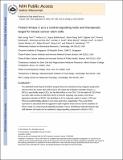| dc.contributor.author | Lu, Haihui | |
| dc.contributor.author | Buikhuisen, Joyce | |
| dc.contributor.author | Soh, Boon Seng | |
| dc.contributor.author | Lim, Elgene | |
| dc.contributor.author | Reinhardt, Ferenc | |
| dc.contributor.author | Wu, Zhenhua Jeremy | |
| dc.contributor.author | Krall, Jordan A. | |
| dc.contributor.author | Bierie, Brian | |
| dc.contributor.author | Guo, Wenjun | |
| dc.contributor.author | Chen, Xi | |
| dc.contributor.author | Liu, Xiaole Shirley | |
| dc.contributor.author | Brown, Myles | |
| dc.contributor.author | Lim, Bing | |
| dc.contributor.author | Tam, Wai Leong | |
| dc.contributor.author | Weinberg, Robert A | |
| dc.date.accessioned | 2018-07-12T18:46:11Z | |
| dc.date.available | 2018-07-12T18:46:11Z | |
| dc.date.issued | 2013-09 | |
| dc.date.submitted | 2013-05 | |
| dc.identifier.issn | 1535-6108 | |
| dc.identifier.uri | http://hdl.handle.net/1721.1/116947 | |
| dc.description.abstract | The epithelial-mesenchymal transition program becomes activated during malignant progression and can enrich for cancer stem cells (CSCs). We report that inhibition of protein kinase C α (PKCα) specifically targets CSCs but has little effect on non-CSCs. The formation of CSCs from non-stem cells involves a shift from EGFR to PDGFR signaling and results in the PKCα-dependent activation of FRA1. We identified an AP-1 molecular switch in which c-FOS and FRA1 are preferentially utilized in non-CSCs and CSCs, respectively. PKCα and FRA1 expression is associated with the aggressive triple-negative breast cancers, and the depletion of FRA1 results in a mesenchymal-epithelial transition. Hence, identifying molecular features that shift between cell states can be exploited to target signaling components critical to CSCs. | en_US |
| dc.description.sponsorship | National Cancer Institute (U.S.) (Grant P01-CA080111) | en_US |
| dc.description.sponsorship | National Institutes of Health (U.S.) (Grant R01-CA078461) | en_US |
| dc.publisher | Elsevier | en_US |
| dc.relation.isversionof | http://dx.doi.org/10.1016/J.CCR.2013.08.005 | en_US |
| dc.rights | Creative Commons Attribution-NonCommercial-NoDerivs License | en_US |
| dc.rights.uri | http://creativecommons.org/licenses/by-nc-nd/4.0/ | en_US |
| dc.source | PMC | en_US |
| dc.title | Protein Kinase C α Is a Central Signaling Node and Therapeutic Target for Breast Cancer Stem Cells | en_US |
| dc.type | Article | en_US |
| dc.identifier.citation | Tam, Wai Leong et al. “Protein Kinase C α Is a Central Signaling Node and Therapeutic Target for Breast Cancer Stem Cells.” Cancer Cell 24, 3 (September 2013): 347–364 © 2013 Elsevier Inc | en_US |
| dc.contributor.department | Massachusetts Institute of Technology. Department of Biology | en_US |
| dc.contributor.department | Ludwig Center for Molecular Oncology (Massachusetts Institute of Technology) | en_US |
| dc.contributor.mitauthor | Tam, Wai Leong | |
| dc.contributor.mitauthor | Weinberg, Robert A | |
| dc.relation.journal | Cancer Cell | en_US |
| dc.eprint.version | Author's final manuscript | en_US |
| dc.type.uri | http://purl.org/eprint/type/JournalArticle | en_US |
| eprint.status | http://purl.org/eprint/status/PeerReviewed | en_US |
| dc.date.updated | 2018-07-12T17:19:32Z | |
| dspace.orderedauthors | Tam, Wai Leong; Lu, Haihui; Buikhuisen, Joyce; Soh, Boon Seng; Lim, Elgene; Reinhardt, Ferenc; Wu, Zhenhua Jeremy; Krall, Jordan A.; Bierie, Brian; Guo, Wenjun; Chen, Xi; Liu, Xiaole Shirley; Brown, Myles; Lim, Bing; Weinberg, Robert A. | en_US |
| dspace.embargo.terms | N | en_US |
| dc.identifier.orcid | https://orcid.org/0000-0002-0895-3557 | |
| mit.license | PUBLISHER_CC | en_US |
